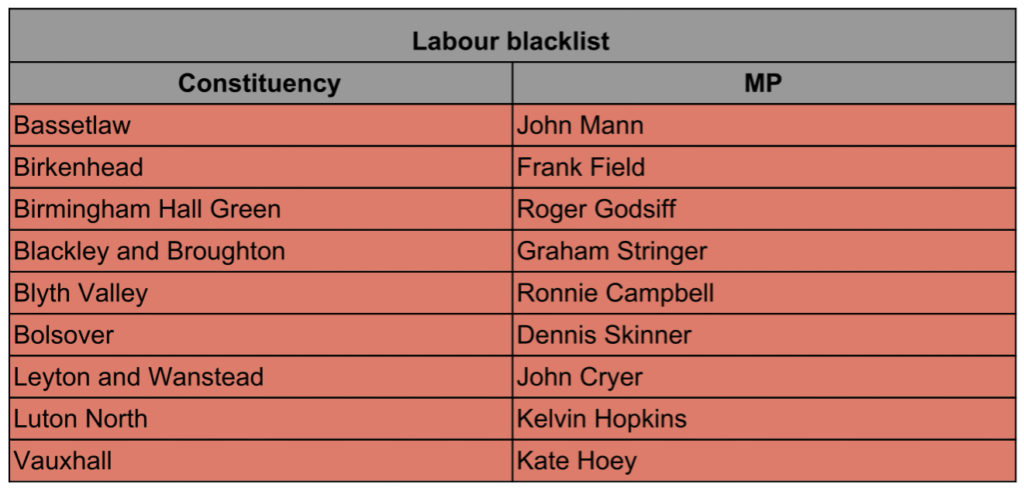Labour’s policy on Brexit is a mixed bag – not as pro-European as that of the Greens or Liberal Democrats, but not as destructive as that of the Tories.
The party’s MPs are also a mixed bag as far as Brexit is concerned: many are pro-European; a few were always Brexiters; another chunk, the majority, have gone along with Jeremy Corbyn’s spineless policies.
InFacts has analysed all the Labour MPs’ records and divided them into white sheep, black sheep and grey ones.
How should you vote?
The criterion for being on the black list was whether they voted Leave in the referendum. Ten were in this category at the time of the referendum. But Gisela Stuart, chair of Vote Leave, has retired. Her replacement in Birmingham Edgbaston is Preet Gill, who campaigned for Remain.
So there are now only nine black sheep – led by Kate Hoey, who joined Nigel Farage on his Thames Armada. All of them have hefty majorities. So although pro-Europeans will want to kick them out, there’s not much chance of doing so.

Our criterion for being a white sheep is whether a Labour MP has had the guts to take a stronger line against Brexit than Corbyn. In most cases, this is because they voted against triggering Article 50, despite the Labour leader trying to force them to back Theresa May on the topic.
There were 52 of such Article 50 rebels. Clive Lewis even resigned from the shadow cabinet in protest against Corbyn’s three-line whip. Meanwhile, MPs such as Helen Goodman beavered away trying to amend the legislation. Others such as Pat McFadden have been vocal supporters of Open Britain, the pressure group fighting a destructive Brexit.
We have also included three senior Labour MPs who are special cases. Keir Starmer has gone along with Labour’s policy as its Brexit spokesperson but, arguably, the policy would have been even worse if he hadn’t fought his corner. Ed Miliband, the former leader, helped organise cross-party parliamentary opposition to a destructive Brexit in the autumn. And Hilary Benn has been fighting a rearguard action against some of the government’s most damaging ideas as chair of the Brexit select committee.
We’ve also added one former MEP, Anneliese Dodds, to the white list, while two of the Article 50 rebels are retiring. That gives a grand total of 64. Pro-European voters should back all of them, except in those cases, such as Daniel Zeichner in Cambridge and Thangam Debbonaire in Bristol West, where they are vulnerable to a Lib Dem or Green challenge and a pro-Brexit party cannot win. In those cases, we are recommending that pro-Europeans pick whichever candidate they prefer.
As well as the white and black sheep are the grey ones. They all backed Remain in the referendum, but haven’t been particularly vocal since. Our attitude to them depends on whether they are vulnerable to a Tory in the election. If so, we think pro-Europeans should back them. If not, we think they should support a candidate from either the Greens or the Lib Dems.

Edited by Luke Lythgoe

I resent your advice to vote against Thangham Debbonaire in Bristol West.
She is a proactive and valuable MP in the island of free thinking that is Bristol. She is a remainer who voted against Article 50.
You should bear in mind that this election is not only about the Brexit disaster, in fact, little is heard of it thanks to the Theresa cock up ‘re health care. So, I urge you to support Thangham Debbonaire.
They are not advising you to ‘vote against her’. Quite the reverse.
Much as it pains me, the recommendation to vote Green or LIb Dem in Winchester as a protest against the back-sliding Tory incumbent (Remainer while Cameron was in charge, now fervently pro brexit despite a 60% remain vote in the referendum) is misguided. The Lib Dem candidate is popular and well-known, and has a real chance. Labour refuses to acknowledge this, but with a real antiTory alliance (which sadly must include the Greens) she could do it. After all, the previous Lib Dem here had the largest parliamentary majority in 1997.